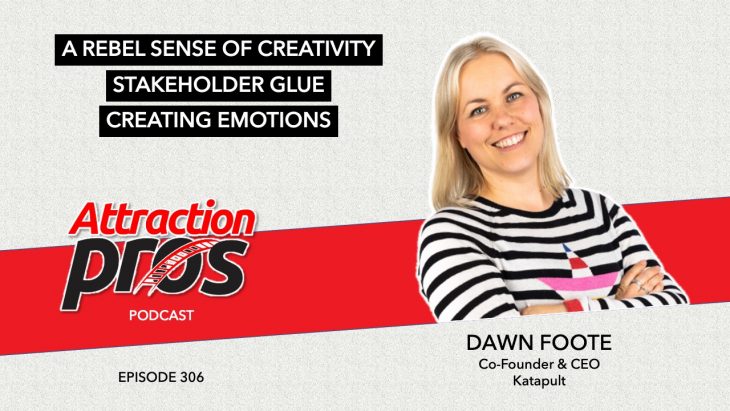
Episode 306: Dawn Foote talks about a rebel sense of creativity, stakeholder glue and creating emotions
Podcast: Play in new window | Download
Subscribe: Android | RSS | More
Dawn Foote is the Co-Founder and CEO of Katapult, a design agency that works with themed attractions and experiences across the globe. Katapult was formed by a group of university students who worked with nightclubs to put on live events. By the time they graduated, the co-founders were able to expand into other industries and sectors and began specializing in themed entertainment in the early 2010s. Today, Katapult designs and creates themed experiences globally and is fortunate to work with some of the world’s most-known intellectual properties. In this interview, Dawn talks about a rebel sense of creativity, stakeholder glue, and creating emotions.
Rebel sense of creativity
“We always have to think in a rebel sense around creativity.”
As a teenager, Dawn states that she was a “rebel with a cause” as she campaigned heavily for the environment and preferred to create her own path rather than conform to standards. This attitude ultimately led to Katapult’s creation and initial success. When working with large brands and intellectual properties, however, there are often strict processes in place that partners need to conform to.
However, when it comes to coming up with creative ideas, Dawn says that they need to have a rebel sense of creativity, fueled by curiosity, that leads to innovative ideas. It also leads to adaptability and being not only suitable to change but knowing that change is part of the process. The rebel sense ensures that they recognize that there is always a way to improve upon something and that they can never sit still.
Stakeholder glue
“We’re the glue between those parties to make sure the needs are met.”
A critical portion of the project management process is managing the stakeholders involved. Whenever it seems that a project might be shifting, it’s important to bring it back to the “why” of the key stakeholders involved in the process. While there may be several opinions from various stakeholders, the project needs to balance the needs of what will make it successful commercially and creatively.
Stakeholders can include the operator, the investors, or the intellectual property, meaning that many needs must be met in order for a project to be considered successful across all parties. Dawn says that Katapult acts as the glue between all of the stakeholders to ensure that each party’s needs are met equally.
Creating emotions
“Part of the design thinking is what the feeling and emotion is that you want people to get.”
Part of Katapult’s guest experience audit when entering into a new project is referred to as emotional journey mapping, which is a less quantifiable form of measuring the guest experience when compared to other metrics that audit objective or binary factors. Emotion, however, is often brought up in initial brainstorming sessions and drives much of the creative process.
Emotional journey mapping takes into consideration the various emotions we want our guests to feel at various times. While many assume that we always want our guests to be happy, there are many other emotions to consider – such as being comfortable, secure, scared, quiet, tranquil, and joyful. All of these emotions play a large role in the design process that can then be felt in the final product.
To learn more about Katapult, visit their website, and to reach out to Dawn directly, you can connect with her on LinkedIn.
To connect with AttractionPros: attractionpros@gmail.com
This podcast wouldn’t be possible without the incredible work of our amazing team:
- Scheduling and correspondence by Kristen Karaliunas
